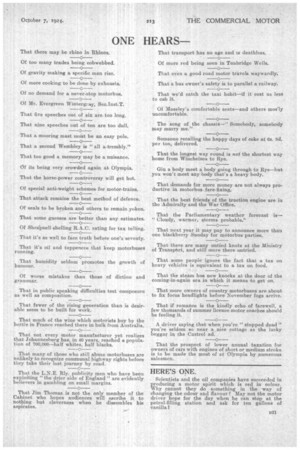ONE HEARS
Page 3

If you've noticed an error in this article please click here to report it so we can fix it.
That there may be rhino in Rhinos.
Of too many trades being cobwebbed.
Of gravity making a specific man rise.
Of more cooking to be done by exhausts.
Of no demand for a never-stop motorbus. Of Mr. Evergreen Wintergl-ay, Sec.Inst.T.
That five speeches out of six are. too long.
That nine speeches out of ten are too dull.
That a mooring mast must be an easy pole. That a second Wembley i6 "all a-trembly."
That too good a memory may be a nuisance.
Of its being very crowded again at Olympia.
That the horse-power controversy will get hot.
—0 Of special anti-weight schemes for motor-trains.
That attack remains the best method of defence.
Of seals to be broken and others to remain yoken. That some guesses are better than any estimates.
Of Shrapnell shelling R.A.C. rating for tax telling.
That it's as well to face truth before one's seventy.
That it's oil and tuppences that keep motorbuses running.
That humidity seldom promotes the growth of humour.
Of worse mistakes than those of diction and grammar.
That in public speaking difficulties test composure as well as composition.
That fewer of the rising generation than is desirable seem to be built for work.
That much of the wine which motorists buy by the bottle in France reached there in bulk from Australia.
That not every motor manufacturer yet realizes that Johannesburg has, in 40 years, reached a population of 700,000—half whites, half blacks.
That many of those who still abuse motorbuses are unlikely to recognize communal highway rights before they take their last journey by road.
That the L.N.E. Rly. publicity men who have been exploiting" the drier side of England" are evidently i believers n gambling on small margins.
That Jim Thomas is not the only member of the Cabinet who hopes audiences will ascribe it to nothing but cleverness when he dissembles his aspirates. That transport has no age and is deathless.
Of more red being seen in Tunbridge Wells.
That even a good road motor travels waywardly.
That a bus owner's safety is to parallel a railway.
That we'd catch the taxi habit—if it cost us less to cab it.
Of Moseley's comfortable seats—and others mos'ly uncomfortable.
The song of the chassis—" Somebody, somebody may marry me."
Someone recalling the happy days of coke at 6s. 8d. per ton, delivered.
That the longest way round is not the shortest way home from Winchelsea to Rye.
Gin a body meet a body going through to Rye—but you won't meet any body that's a heavy body.
That demands for more money are not always productive in motorbus fare-fixing.
That the best friends of the traction engine are in the Admiralty and the War. Office.
That the Parliamentary weather forecast is— Cloudy, Cloudy, warmer, storms probable.'" That next year it may pay to announce more than one blackberry Sunday for motorbus parties.
That there are many untied knots at the Ministry of Transport, and still more there untried.
That some people ignore the fact that a tax on heavy vehicles is equivalent to a tax on food.
That the steam bus now knocks at the door of the coming-in-again era in which it means to get on.
That more owners of country motorbuses are about to fix focus headlights before November fogs arrive.
That if romance is the kindly echo of farewell, a few thousands of summer licence motor coaches should be feeling it.
A driver saying that when you're "stopped dead" you're seldom so near a nice cottage as the lucky beggar in the Castrol ad.
That the prospect of lower annual taxation for owners of cars with engines of short or medium stroke is to be made the most of at Olympia by numerous salesmen.






























